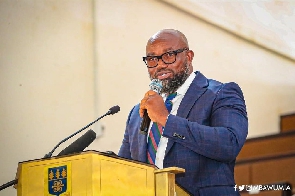 Executive Chairman of McDan Group of Companies, Dr. Daniel Mckorley
Executive Chairman of McDan Group of Companies, Dr. Daniel Mckorley
Executive Chairman of McDan Group of Companies, Daniel Mckorley, has attributed Ghana’s slow economic growth to the lack of indigenous businesses controlling key sectors of the economy.
To this end, he has challenged businesses in the country to re-strategise to be able to control certain sectors of the economy and set the path for Small and Medium-scale Enterprises (SMEs) to deliver services and products and become the engine of growth.
Speaking at the 74th Annual New Year School in Accra, he said western and Asian countries including USA, Germany, and Japan developed because key industries such as iron, steel, rail, and banking were controlled by indigenous industrialists.
The event was on the theme “Positioning the African Market for Sustainable Economic Development through AFCFTA.”
Ghanaian businessmen, however, Mr Mckorley noted, do not control many sectors but rather contribute.
“In Ghana, banking is controlled by Nigerians and South Africans, retail is controlled by Lebanese and Indians. The Telecom sector is controlled by British and South Africans. Oil and gas, mining, trading, you name it, they are controlled by foreigners,” he added.
He said, despite the importance of small businesses, they do not build nations saying that “when big businesses build small businesses rally around and push plug in grow and become the true engine of growth.”
“I believe when competent Ghanaian Industries are given right opportunities, especially in the growth industries they will execute, and the SMEs will thrive as well,” Mr Mckorley stated.
The Africa Continental Free Trade Area (AFCFTA), he said, was an opportunity private sector in multiple countries in Africa to thrive and grow to control key sectors of their economy as it served as a boost in international trade.
He urged the private sector to educate themselves comprehensively about AFCFTA from policy context to concept execution to minimise and eliminate concerns and strengthen the bases.
He further called for partnerships to enable the exploration of all segments within AfCFTA to ensure the successful implementation of AfCFTA and realisation of the benefits.
As main drivers of Agenda 2063, Mr. Mckorley called for effort and keen interest in the participation of the youth in the AfCFTA as well as the designation of specific participatory roles and a platform to enable them build their human capital.